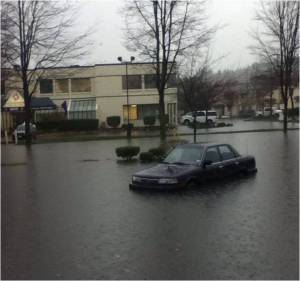02 Oct Wet and wild?!?

The deluge that visited parts of New England this past week left a lot of water-damaged buildings and cars in its wake. The first call many owners made was to their insurance agent to report a claim. Sadly, some of those conversations ended with, “I’m sorry but you’re not covered.” What? You paid your premiums! Before you go wild, read on.
First, let’s understand that the two highest months for rain in the region are October and November so if you don’t know if you have the right coverage, call to your agent now. You don’t want to be told after a storm that you have to pay out of your own pocket for damage. So can you get insurance for flooding? Yes, but…..
When water enters a building from a storm runoff, most insurance companies’ basic policy doesn’t offer coverage for damage. Specifically, basic homeowner coverage excludes water damage from flood, surface water, waves, tidal waves and overflow from streams and other bodies of water. Also generally excluded is damage from water backed up from sewers or drains as well as water below the surface of the ground that seeps through sidewalks, walls, basements, floors or windows.
To be protected to some extent, you need to buy extra insurance coverage.
You can buy a Water Back Up and Sump Discharge or Overflow Endorsement. For a nominal amount, this coverage typically offers $2,500 in coverage for clean up, repair and replacement. Higher limits can be purchased at a greater cost.
You also can buy flood coverage from the National Flood Insurance Program. As it states on their web site:
Just a few inches of water from a flood can cause tens of thousands of dollars in damage. From 2010 to 2014 the average residential flood claim amounted to more than $39,000. In 2014, the average flood insurance policy premium was about $700 per year. Flood insurance is the best way to protect yourself from devastating financial loss.
Flood insurance is available to homeowners, renters, condo owners/renters, and commercial owners/renters. Costs vary depending on how much insurance is purchased, what it covers and the property’s flood risk.
All policy forms provide coverage for buildings and contents. However, you might want to discuss insuring personal property with your agent, since contents coverage is optional. Typically, there’s a 30-day waiting period from date of purchase before your policy goes into effect.
Here’s the language in the NFIP policy you must understand if you are buying federal flood insurance:
- Flood, as used in this flood insurance policy, means:
- A general and temporary condition of partial or complete inundation of two or more acres of normally dry land area or of two or more properties (one of which is your property) from:
- Overflow of inland or tidal waters,
- Unusual and rapid accumulation or runoff of surface waters from any source,
- Mudflow
In other words, there are conditions that have to be met in order to have a claim paid. Even in a federal insurance program, there are a lot of “ifs, ands or buts” which means you should always work with a skilled insurance agent for guidance.For owners of flooded vehicles, the likely choice you made months or years ago may not have included comprehensive coverage for your vehicle. All states require some form of minimum liability coverage to protect victims from financial hardship you have caused. Most drivers also buy collision coverage to pay for repairs for their own car when they are at fault. However, if you want to protect yourself for damage to your own vehicle not related to a collision, you should buy comprehensive coverage.Comprehensive coverage includes damage from specific perils such as theft or vandalism, fire, falling objects like ice coming off a roof and natural disasters such as floods, hurricanes or tornadoes. But, as with all insurance policies, coverage and limits may differ from company to company.No matter what property or vehicles are damaged by water, be sure you take all precautions in getting them dried out. Sometimes the worst damage is done long after the flood by mold – another condition that may or may not be covered. Call an agent to be sure.



